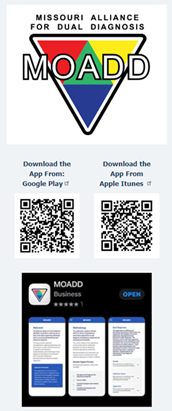Clinical support for people with co-occurring behavioral health symptoms and intellectual/developmental disabilities.
The Missouri Alliance for Dual Diagnosis (MOADD) Taskforce announces the release of its Best Practices Guidebook. The objective of the MOADD Taskforce is to research, define and describe best clinical practices to support people with co-occurring mental/behavioral health symptoms and a diagnosed intellectual/developmental disability (IDD), including Autism Spectrum Disorder (ASD).
In Missouri, on average 37 percent of individuals with IDD in residential services also have a co-occurring mental health or substance use concern. The MOADD Taskforce, comprised of 25 members, convened in March 2019 and began to create consolidated resources and decision aids to guide treatment consideration for individuals with developmental/intellectual disabilities and behavioral health dual diagnoses.
“We know that individuals with IDD can be successful in behavioral health treatment,” said Valerie Huhn, Director of the Department of Mental Health (DMH). “The department is committed to building bridges across the division silos and ultimately creating a holistic system that seamlessly meets the needs of Missourians with IDD and behavioral health needs across the lifespan.”
“Individuals will benefit and avoid crisis situations as a result of advanced treatment and support from better informed clinicians,” said Dr. Angeline Stanislaus, DMH Chief Medical Director.
The Best Practices Guidebook includes approach considerations, supporting literature, and information to make informed support and treatment decisions. The guidelines identify safety concerns, treatment approaches, biological and psychosocial factors, trauma, interventions, and case vignettes for four behavioral combinations (anxiety, substance use, aggression and depression) with developmental/intellectual disabilities.
“Healthcare professionals are busier now more than ever, so to make the information more accessible, a MOADD app was developed,” said Jessica Bax, Director of DMH Division of Developmental Disabilities. “The app provides all of the information in a real time decision-making format.” See the image below to access the app.
“The app marries the comprehensive resources available in a convenient, immediate, and tech-friendly spot,” said Nora Bock, Director of DMH Division of Behavioral Health. “These guidelines highlight that people are more alike than different and that enhanced skill sets improve services delivered to those with complex conditions.”
See the image below to access the app.
The complete MOADD Best Practices Guidebook can be found at: https://dmh.mo.gov/moadd. For more information contact Debra Walker debra.walker@dmh.mo.gov or 573-751-1647.

